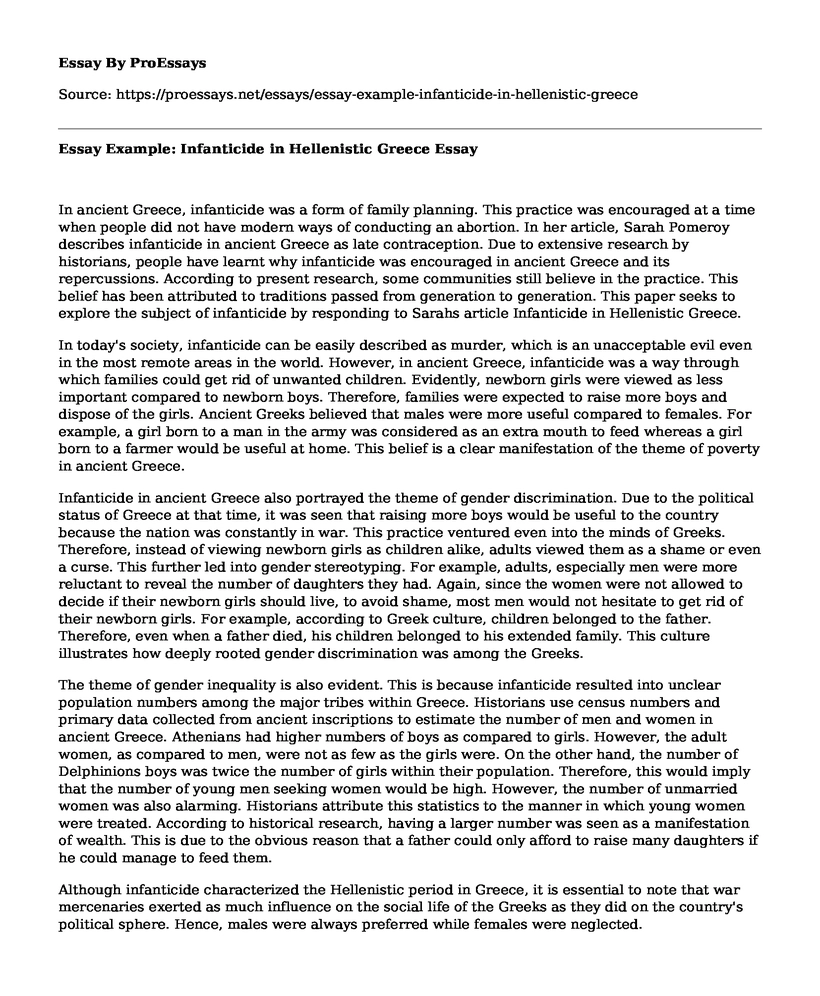In ancient Greece, infanticide was a form of family planning. This practice was encouraged at a time when people did not have modern ways of conducting an abortion. In her article, Sarah Pomeroy describes infanticide in ancient Greece as late contraception. Due to extensive research by historians, people have learnt why infanticide was encouraged in ancient Greece and its repercussions. According to present research, some communities still believe in the practice. This belief has been attributed to traditions passed from generation to generation. This paper seeks to explore the subject of infanticide by responding to Sarahs article Infanticide in Hellenistic Greece.
In today's society, infanticide can be easily described as murder, which is an unacceptable evil even in the most remote areas in the world. However, in ancient Greece, infanticide was a way through which families could get rid of unwanted children. Evidently, newborn girls were viewed as less important compared to newborn boys. Therefore, families were expected to raise more boys and dispose of the girls. Ancient Greeks believed that males were more useful compared to females. For example, a girl born to a man in the army was considered as an extra mouth to feed whereas a girl born to a farmer would be useful at home. This belief is a clear manifestation of the theme of poverty in ancient Greece.
Infanticide in ancient Greece also portrayed the theme of gender discrimination. Due to the political status of Greece at that time, it was seen that raising more boys would be useful to the country because the nation was constantly in war. This practice ventured even into the minds of Greeks. Therefore, instead of viewing newborn girls as children alike, adults viewed them as a shame or even a curse. This further led into gender stereotyping. For example, adults, especially men were more reluctant to reveal the number of daughters they had. Again, since the women were not allowed to decide if their newborn girls should live, to avoid shame, most men would not hesitate to get rid of their newborn girls. For example, according to Greek culture, children belonged to the father. Therefore, even when a father died, his children belonged to his extended family. This culture illustrates how deeply rooted gender discrimination was among the Greeks.
The theme of gender inequality is also evident. This is because infanticide resulted into unclear population numbers among the major tribes within Greece. Historians use census numbers and primary data collected from ancient inscriptions to estimate the number of men and women in ancient Greece. Athenians had higher numbers of boys as compared to girls. However, the adult women, as compared to men, were not as few as the girls were. On the other hand, the number of Delphinions boys was twice the number of girls within their population. Therefore, this would imply that the number of young men seeking women would be high. However, the number of unmarried women was also alarming. Historians attribute this statistics to the manner in which young women were treated. According to historical research, having a larger number was seen as a manifestation of wealth. This is due to the obvious reason that a father could only afford to raise many daughters if he could manage to feed them.
Although infanticide characterized the Hellenistic period in Greece, it is essential to note that war mercenaries exerted as much influence on the social life of the Greeks as they did on the country's political sphere. Hence, males were always preferred while females were neglected.
Cite this page
Essay Example: Infanticide in Hellenistic Greece. (2021, Apr 01). Retrieved from https://proessays.net/essays/essay-example-infanticide-in-hellenistic-greece
If you are the original author of this essay and no longer wish to have it published on the ProEssays website, please click below to request its removal:
- Biography of Isaac Newton
- Critiquing Colonization of Nature: Buying from Killjoy's "Wardens"
- Lopez Lomong Biographical Essay
- Book Review: Consequences of European Invasion Into the New World
- Essay on Influence of Language on Culture
- The Gettysburg Address Rhetorical Strategies Essay Example
- Paper Sample on The Painted Bird: An Unbearable Tale of Man's Cruelty







